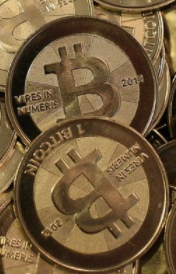What is Bitcoin?
Bitcoin is a digital currency that operates through cryptographic principles to regulate and generate units of currency. It stands as the pioneering decentralized digital currency, functioning without the oversight of a central bank or single administrator. Due to its decentralized nature, the Bitcoin network remains immune to government interference or alterations in its technical protocols. Transactions conducted using Bitcoin are anonymized through encryption keys, allowing buyers and sellers to interact without revealing personal identifiers such as names, tax IDs, or social security numbers.
Bitcoins are rewarded to miners through a process called mining and can be exchanged for various currencies, products, and services. According to research conducted by Cambridge University, there were between 2.9 million and 5.8 million unique users with cryptocurrency wallets in 2017, with a significant majority using Bitcoin. This digital currency is commonly referred to using terms such as cryptocurrency, digital cash, virtual currency, electronic currency, or cryptocurrency.
Who created it?

Bitcoin falls under the category of cryptocurrencies and holds the distinction of being the first and most valuable among them. Cryptocurrencies are designed to offer maximum anonymity, with the true identity of Bitcoin's creator remaining unknown. On August 18, 2008, the domain name "bitcoin.org" was registered, and in November of the same year, a paper authored by an individual using the pseudonym Satoshi Nakamoto titled "Bitcoin: A Peer-to-Peer Electronic Cash System" was shared on a cryptography mailing list. Nakamoto's objective was to develop "a new electronic cash system" that operated in a completely decentralized manner without the need for a central authority or server. The innovation behind Bitcoin was solely governed by software, designed to release a total of twenty-one million bitcoins, with the majority scheduled to be introduced over the next two decades.
How does Bitcoin work?
Bitcoin is a form of digital currency that facilitates direct peer-to-peer transactions without the need for intermediaries like banks or credit card companies. As a user, you can easily get started with Bitcoin by installing a Bitcoin wallet on your computer or mobile phone, which generates a unique Bitcoin address for each transaction.

Transactions in the Bitcoin system occur directly between users in a decentralized manner. Bitcoins are stored in digital wallets, which can be cloud-based, on smartphones, or computers. You can also set up your own wallet on your device. All Bitcoin transactions are recorded in a public ledger called the Blockchain. To spend bitcoins, users use their private key to cryptographically sign the transaction, which is then broadcasted to the network. The network's computers work together to update the Blockchain, indicating that the sender's address no longer holds the sent amount, and the amount is now held by the recipient's address. Each set of transactions is recorded on the Blockchain approximately every 10 minutes.
What determines the value of a bitcoin?
Bitcoins are generated through a mathematical process rather than being subject to monetary policy. As a result, Bitcoin's supply is limited, and its price is solely determined by the forces of supply and demand. Due to this scarcity and high demand, Bitcoin has become one of the most valued currencies in the world, with public perception and utility playing a significant role in shaping its long-term price.
The value of Bitcoin is determined by the average price at which buyers and sellers are willing to transact on various Bitcoin exchanges for different currency pairs. Currently, there are over 16.7 million BTC in circulation, and the network is designed to cap the total supply at 21 million bitcoins, ensuring there will never be inflation in the Bitcoin system. Bitcoin can be exchanged for other currencies, goods, or services, allowing for fluid transactions in a global marketplace.
Acquiring Bitcoins

To acquire bitcoins, a user can either utilize a bitcoin exchange or accept them as payment. The process begins with setting up a wallet to securely store the bitcoins. Subsequently, traditional payment methods like credit cards, bank transfers, or debit cards can be employed to purchase bitcoins from a bitcoin exchange such as Coinbase. Once acquired, the bitcoins are transferred to the user's wallet, which contains both a private key for currency ownership transfer and a public key (or address) for receiving funds. The private key remains confidential, ensuring only the owner can spend or transfer the currency, while the public key is accessible to all, enabling others to send money to that specific address.
The growing number of places accepting bitcoins for transactions includes major retail players and numerous small businesses and retailers. Japan has also recently embraced bitcoin as a payment mode, indicating the increasing acceptance and adoption of this digital currency.
What is the future of bitcoin?
The future of bitcoin remains uncertain, but its popularity is steadily increasing on a global scale. Numerous prominent merchants, including Expedia, Dell, and Microsoft, have embraced it as a form of payment. While bitcoin remains largely unregulated, some countries like Japan, China, and Australia are contemplating regulatory measures. Governments worldwide are gradually displaying more acceptance of bitcoin, although concerns persist regarding taxation and their limited control over the currency. It is not inconceivable that one day cryptocurrency could potentially become a universal standard currency for transactions, ushering in a new era of global financial transactions.
Conclusion
Bitcoin is a popular and decentralized digital currency gaining acceptance from various merchants globally. While still largely unregulated, some countries are exploring regulations, and governments show growing interest in its potential implications for taxation and currency control. The future of bitcoin remains uncertain, but its increasing popularity hints at the possibility of it becoming a more widely adopted form of universal currency for transactions in the future.
- How to Print Screen
- How to View Hidden Files in Windows 11, 10, 8 and 7
- Fahrenheit to Celsius Temperatire Conversion Formula
- How to zip files - Compress and uncompress files
- How to Use Robocopy
- How to WMIC ?
- How to recover deleted files
- Microsoft Outlook POP3 Settings, Microsoft Outlook IMAP Settings
- How to Update Windows 11
- What is Three-Tier Architecture ?
- What Is an API (Application Program Interface) ?
- Differences Between HTML4 And HTML5
- How to choose the best antivirus software
- How to Embed a YouTube Video in Your Website
- what is the difference between x64 and x86
- Learn Multiplication of Tables
- What is a Proxy Server?
- How to use a Google Android phone as a Wi-Fi hotspot
- How to automatically redirect a Web Page to another URL
- How to Download YouTube Videos
- What is a Phishing Attack ? How can I avoid them?
- What is a Call To Action?
- What's the Difference Between JPG and PNG?
- What Is a "500 Internal Server Error" and How Do I Fix It?
- What is the difference between OTF and TTF fonts
- How to enable flash player on chrome
- How to Select a Video Editing Software
- Why am I getting a "Your connection is not private error" in Chrome
- How to block "Deceptive site ahead" security error?
- Crypto for beginners: What is cryptocurrency?
- How to fix HTTP Error 502 Bad gateway
- GET url returns "data:text/html,chromewebdata"
- Chrome:Your Clock Is Ahead / Your Clock Is Behind Error
- How to fix ERR_UNKNOWN_URL_SCHEME
- SSL Error on Port 443
- How to Fix This Site Can't Be Reached Error in Chrome
- A disk read error occurred, Press Ctrl+Alt+Del to restart
- How to use System Restore on Windows 10
- What is HTTP error 503 and how do you fix it?
- How to get help in Windows 10
- How To Disable Windows 10 Forced Updates
- How to Fix Google Chrome Error - ERR_SSL_PROTOCOL_ERROR
- How to reset windows 10 password
- What is Blockchain?
- How To Fix: ERR_PROXY_CONNECTION_FAILED
- Unable to send mail through smtp.gmail.com
- How to fix DNS_PROBE_FINISHED_NXDOMAIN
- How to use GTMetrix to Speed up Your Website?
- How to fix System Thread Exception Not Handled Error
- How to fix ERR_INTERNET_DISCONNECTED Error
- WiFi Connected But No Internet Access – How to Fix?
- How to fix a HTTP Error 400: Bad Request?
- What is Deprecation
- How to Fix a 403 Forbidden Error
- What is the maximum length of a URL in different browsers?
- SSL Certificate Problem: Unable to get Local Issuer Certificate
- How to Fix the ERR_CONNECTION_TIMED_OUT Error
- What does localhost:8080 mean?
- How to reduce initial server response time
- 414 Request-URI Too Long - HTTP
- Message channel closed before a response was received